| Srl | Item |
| 1 |
ID:
191674


|
|
|
|
|
| Summary/Abstract |
While the theory of the Chinese School of International Relations (CSIR) has contributed new dimensions to IR such as the concept of relationality into theorisation practice, it also faces the same pitfalls as the schools of thought that precede it: it pays insufficient attention to the relationship between ethics and subjectivity despite its repetitive use of such concepts as ‘morality’ in its articulation of contemporary world affairs and insufficient attention to the ethical dimension of IR that makes this approach prone to dismissing the voices of ‘others’. This ethical problem in CSIR emanates from inadequate consideration of temporality and its relation to ethics. However, introducing the present, or Nikon (而今), an Asian-originating case of temporality based on the Mahāyāna Buddhist ontological ethics, illustrates how this manifestation of Buddhist temporality offers solutions to mitigate the ethical drawback of the Chinese School discourses.
|
|
|
|
|
|
|
|
|
|
|
|
|
|
|
|
| 2 |
ID:
086808
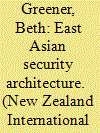

|
|
|
|
|
| Publication |
2009.
|
| Summary/Abstract |
East Asian security architecture is, as many scholars seem to enjoy pointing out,neither particularly complete in reach and depth nor excessively concrete in terms of levels of permanency. Indeed Alan Romberg, a senior associate at the Henry L Stimson Centre, has argued that Security Architecture is too grand a term for what currently exists in East Asia and what is likely to exist in the foreseeable future.
|
|
|
|
|
|
|
|
|
|
|
|
|
|
|
|
| 3 |
ID:
111706
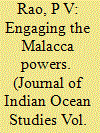

|
|
|
| 4 |
ID:
159264
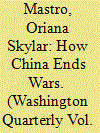

|
|
|
| 5 |
ID:
099769
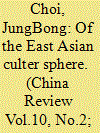

|
|
|
|
|
| Publication |
2010.
|
| Summary/Abstract |
This essay questions the conceptual pertinence of globalization in analyzing the fast growing culture exchanges across east and south East Asia. Critiquing the theoretical backbone of globalization, it proposes a shift to cultural regionalization as an interpretive framework suited to emergent culture topographies of the region. The essay then details the major attributes of culture regionalization by introducing what might be termed the East Asian culture sphere, a temporary crystallization of East Asian culture interdynamics that has emerged in the post cold war juncture and continues to evolve to date. In an attempt to give concrete picture s of both culture regionalization and east Asian culture Sphere, the essay broaches the instance of Hallyu, the Korean wave, a culture crosscurrent arising from the collision of two opposing waves the escalation of political tension based on post/colonial feuds, which remained largely unaddressed during the cold war period, on one hand and the sweeping economic integration and collaboration of east Asia on the other
|
|
|
|
|
|
|
|
|
|
|
|
|
|
|
|
| 6 |
ID:
111034
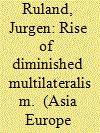

|
|
|
|
|
| Publication |
2012.
|
| Summary/Abstract |
The article argues that the "principled multilateralism" of the immediate post-Cold War period is increasingly giving way to what may be called a "diminished multilateralism." Newly emerging global and regional powers such as the BRICS states (Brazil, Russia, India, China and South Africa) and other rising powers in the Global South are increasingly questioning the legitimacy of the existing international architecture which they regard as a vehicle of the USA and Western countries to conserve their international influence in an era of rapid change. In the process, international institutions have increasingly become arenas of power rivalries which take the form of contests over access and membership, decision-making rules and normative order. The result is an increasing paralysis of these institutions and their inability to solve global problems. One aspect of these institutional power struggles is "forum shopping." The article shows that East Asia and Europe have both become active players in forum shopping. Three conditions facilitated forum shopping: major crises and external shocks; sentiments of frustrated entitlement in connection with exclusive and discriminatory international institutions, and extra- and intra-regional power shifts.
|
|
|
|
|
|
|
|
|
|
|
|
|
|
|
|